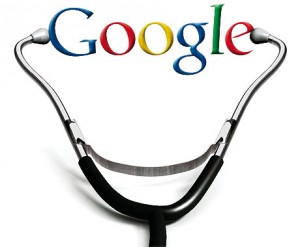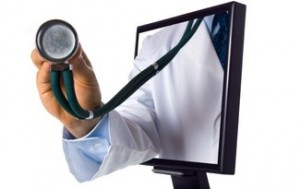The rise of the e-patient
Pros and cons of Dr Google and the e-patient
Will Dr Google make the good old-fashioned face-to-face visit to the GP a thing of the past in the future? The question naturally arises after new research by the Medibank 24/7 Health Advice Line highlighted an alarming pattern of people seeking health advice from the nearest possible places: the internet, family and even social media.
The survey found that 3 out 4 Australians have searched for their own symptoms online; whilst one in 10 prefer to do nothing and just worry and one in five admitted to misdiagnosing themselves.

Image sourced from Survivor: Pediatrics.wordpress.com
Among the main reasons given by respondents for the drive to online diagnosis were that it’s too hard to get an appointment (33%), they’re too busy (29%), or they can’t get time off work (15%). The survey also revealed that, given access to a 24/7 health advice line, 66% would be more likely to use it.
The study also showed nearly half the country (42%) keep silent about their health worries and tell no-one at some point. The findings were released to coincide with the recent ‘Talk to an Expert Week’ (August 26-31, 2013).
It prompts the question, is the drive to online healthcare always such a bad thing? It could be argued that we are a much more informed society and it is therefore a positive trend, avoiding unnecessary visits to the doctor or clogging up emergency departments.
Digipharma embraces change
Earlier this year at the 2013 Digital Pharma Series jointly hosted by VIVA! And Princeton Digital, Dr George Margelis from Care Innovations referred to major changes in health over time, marking a natural swing toward electronic delivery of healthcare. “One huge change during the last couple of years has been the rise of the e-patient… patients go to Dr Google before Dr George. This is not necessarily a bad thing,” he said.
However the statistics are a worry to many medical experts. Commenting on the Medibank study findings, Dr Cindy Pan, medical practitioner, best-selling author and media personality said:
“It’s concerning that despite having some of the best medical services in the world, Australians are sometimes relying on the Internet and other sources for health advice rather than seeking expert medical advice from a GP or health professional.”
Medibank 24/7 Health Advice Line Study Key Findings:
- 63% of 18-24 years olds would still prefer to search symptoms for sexual health online rather than talk to an expert
- 1 in 10 have turned to friends for health advice on Facebook. The social networking site is increasingly being used to swap health advice across all ages, with nearly a third (28%) noticing health topics being discussed. The most common subjects being discussed are children’s health, colds and fevers
- 1 in 5 young Aussies turn to a family member for advice first before anything else
- 49% believe their parent’s advice is reliable
- 76% of us have surfed the Internet for information on symptoms, most commonly looking up sexual health, rashes and medications
- 35% have been too embarrassed to speak to someone face to face
Dr Georgia Karabatsos, Medibank 24/7 Health Advice Line Medical Director warned that the habit of consulting the internet should not replace a visit to a health professional.
“We do get calls to the Medibank 24/7 Health Advice Line, from people who want to discuss their symptoms and what they believe is their diagnosis based on internet research or social network advice. A credible health professional needs to be the first port of call for all health advice.
“The internet and your mum are not doctors, so we are calling on all Australians to put an end to misdiagnosis and talk to a qualified health professional.”
Healthcare professionals as filters
However, as this research shows, the horse has already bolted. This was one of the other resounding messages to come out of Digipharma. Dr Jane Muir, Head of Translational Nutrition Science in the Department of Gastroenterology at Monash University said that she was ‘despairing’ of the quality of much of the health information people receive online.
“Patients need accurate, up-to-date information that’s available all the time.”
Similarly, another speaker at the event, Sydney Pharmacist Tom Corte saw it as part of the community pharmacist’s role as a trusted professional to filter through that material to help achieve a better health outcome for the patient.
“Health care is the second most searched topic on the internet. I have to figure out a way to get to be involved in that and educate consumers in the right way,” Mr Corte said.


This was an extremely fascinating and well written blog – I myself have self-diagnosed several times using the internet for the same reasons suggested in the blog. It is reassuring to know that this is common, but also concerning as a wrong self-diagnosis could be incredibly detrimental if a health professional is not consulted. It is hugely important that this kind of research continues and is communicated as well as it is in this blog. Very interesting.
Great blog post
[…] compared to our Dr. Google blog post, where misdiagnosis is considered a major pitfall of going online to obtain health information, […]